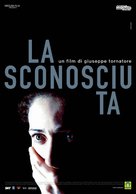Reviews provided by RottenTomatoes
Amy Nicholson, Boxoffice Magazine: Postures as empathetic while getting its leading lady out of her skivvies -- there's nothing bold about taking a stance against human trafficking Read more
Andrea Gronvall, Chicago Reader: The melodrama form allows Tornatore to examine such current issues as human trafficking and black-market babies within a yarn that, for all its sentiment, is never less than gripping. Read more
Moira MacDonald, Seattle Times: Tornatore, best known for Cinema Paradiso, has meticulously crafted a story that's at times so raw it hurts to watch. Its action blends piercingly lit flashbacks and dream sequences with a gray, prosaic present in an unnamed Italian city. Read more
Ty Burr, Boston Globe: Plays like a cross between Hitchcock and tabloid feminism, a mix that shouldn't work and doesn't. Read more
Kevin Thomas, Los Angeles Times: Everyday incidents trigger in Irena alternately sweet and horrific memories, and these become like pieces in a jigsaw puzzle that is completed only when the film concludes, at last revealing its full meaning. Read more
Peter Rainer, Christian Science Monitor: An unstable concoction of political melodrama, film noir, and weepie. Read more
Lisa Schwarzbaum, Entertainment Weekly: [A] baroquely lurid and undeniably fascinating exercise in pulp with a political angle. Read more
Ella Taylor, L.A. Weekly: Meet the filmmaker that [Tornatore] is today -- sadomasochistic fantasist, exploiter of women and cheesy Hitchcock imitator. Read more
V.A. Musetto, New York Post: It gets more and more ridiculous and unbelievable as it goes along, and the final scene is shamelessly manipulative. Read more
Roger Ebert, Chicago Sun-Times: A spellbinder with a lot of Hitchcock touches and an Ennio Morricone score to match. Read more
Andrew O'Hehir, Salon.com: An exceptionally well-made example of the kind of delirious, semi-Gothic, overcooked melodrama filmmakers from the Boot have long specialized in. Read more
Mick LaSalle, San Francisco Chronicle: The whole movie hangs on the gradual unraveling of the central mystery and is made with the expectation that the audience is fascinated and hanging on every tidbit. But Tornatore overplays his hand. Read more
Kamal Al-Solaylee, Globe and Mail: This is a case where style has not only trumped substance, but negated it as well. Read more
Susan Walker, Toronto Star: Rappoport is the movie's saving grace. Read more
Deborah Young, Variety: The film has major problems blending the strong social theme of exploitation and white slavery with Tornatore's noirish screenplay, full of holes and improbabilities. Read more
Ann Hornaday, Washington Post: The Unknown Woman falters when it falls into exploitation and fatal contrivance. Read more

